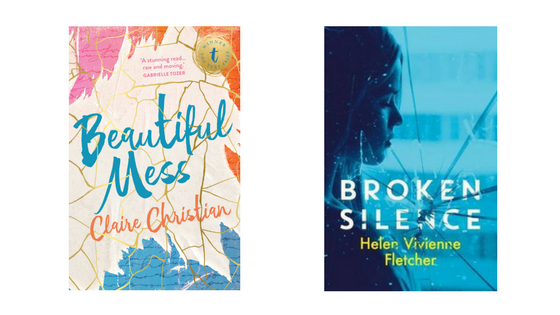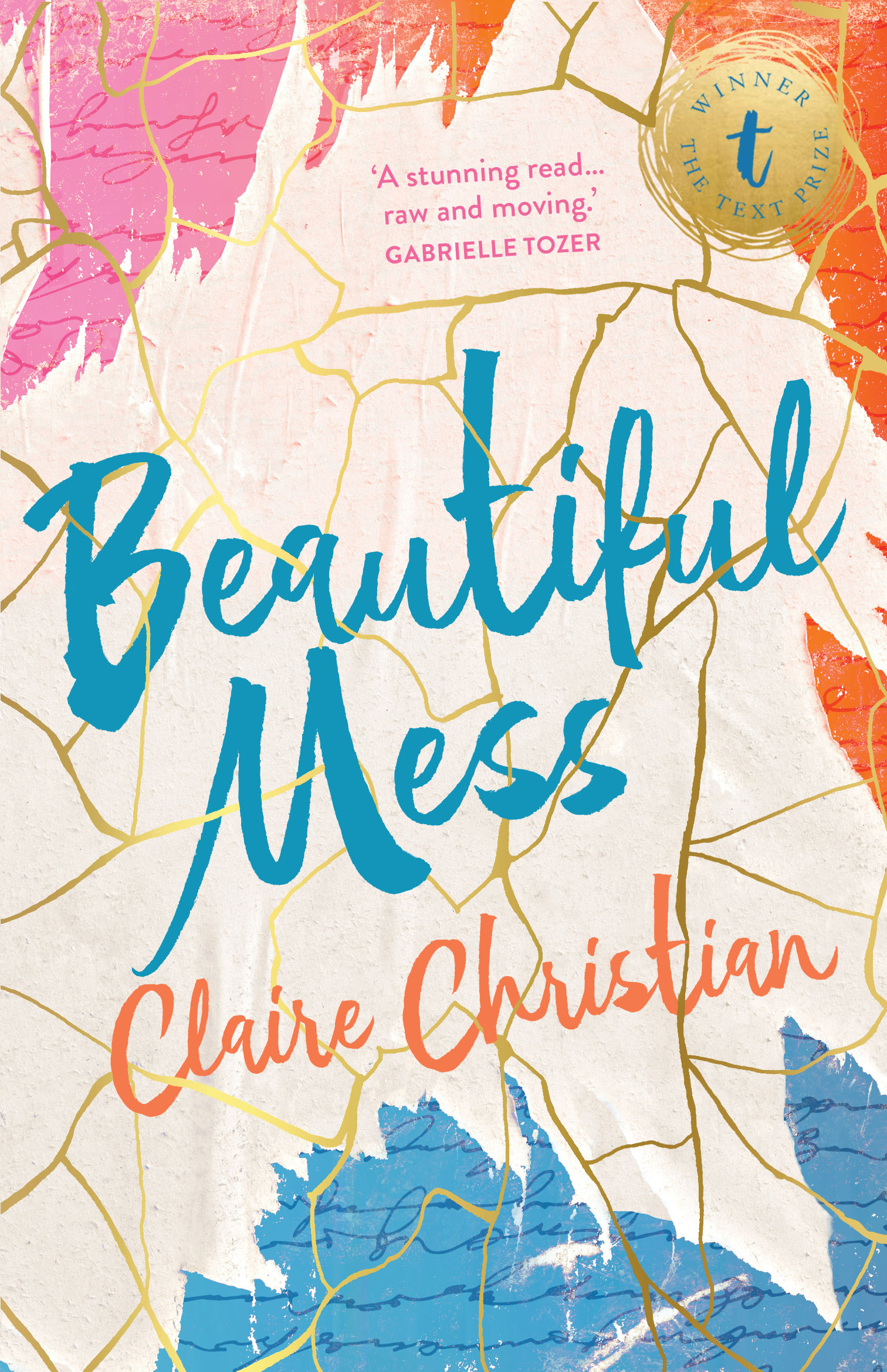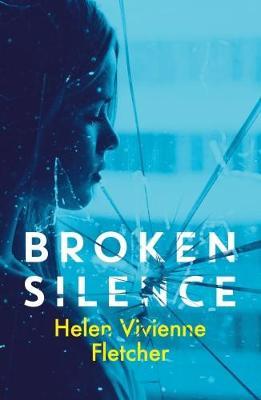If there is a trend right now in YA publishing, it has to be toward gritty teen drama, usually including the death of somebody close and plenty of angst. Beautiful Mess, by Claire Christian won the 2016 Text Prize, and it is one of the best YA books in this vein that I have read. Broken Silence, by Helen Vivienne Fletcher is a gripping psychological thriller.

Beautiful Mess, by Claire Christian
A trend in YA in books I have read this year – as I mentioned in my review of Zeustian Logic – is the fallout of the death of a loved one. Beautiful Mess is certainly within this trend, but it also happens to be the most sensitive explanation of depression and how it affects lives that I have ever read.
Our two lead characters are Ava and Gideon, and the novel is told alternately in their voices. Ava is adrift, cast off her moorings by the depression-related suicide of her best friend Kelly. The two of them were those inseparable friends, the ones that did everything together and needed nobody else in their friendship. The intensity of their friendship was the most solid part of Ava’s knowledge of herself. As the novel opens, Ava stands up and screams in assembly ‘She didn’t fall. She died.’ ‘She’s dead.’
As the novel opens, Ava stands up and screams in assembly ‘She didn’t fall. She died.’ ‘She’s dead.’
Gideon is a poet: a slam poet, who suffers from anxiety and depression. We meet him as he gets ready to go to a job interview, psyching himself up in a toilet with an erectile dysfunction ad on the back of the cubicle door. He writes lists, poetry: he doesn’t have a phone or iPad, nor does he use the internet (except in special circumstances). He has been bullied, and this has in the past led to some dark places. He is now functioning on medication, but he is bored. ‘Maybe being bored is a good thing. Because what that actually means is that things aren’t like they were. And that’s all I ever really want, for things to never be like they were.’
They meet at Magic Kebab, when Gideon gets a job there as a dishwasher. They are at the same school, but Ava doesn’t recognise Gideon: he recognises her. He immediately wants to get to know her, and compiles a list of acceptable conversation starters (music, movies, TV…) which one of his mums, Susan, begs him not to use. As it happens, he breaks the ice somewhat differently – joining in a rap battle with some African boys in the Kebab shop late one night. Ava is intrigued.
The development of their friendship goes through several stages of intensity, and is underpinned by letter writing. Because Gideon doesn’t text, and they no longer go to the same school (Ava gets expelled not long after they meet, and goes to an alternative school), letter-writing is their preferred method of communication. Gideon: ‘I’m glad we met. That’s important.’ Ava: ‘Can you even read my handwriting? You have nice handwriting. I feel like I have shit handwriting.’
So yes, there is a romance. But somehow, while hitting so many YA tropes, Christian also somehow makes her story more essential than others. The voices of the two main characters are so clear, that you can see them sitting in their rooms, or at the dining room table, talking or writing. I could hear the tone of their voices in the tone of her writing. Here’s a great example: ‘”So, we just need to talk about it,” Mum says, ripping the bandaid off the tension that has seethed ever since they caught me and Ava naked in the hallway….”Do we, though?” I put my head in my hands and lean my elbows on my knees.’
The voices of the two main characters are so clear, that you can see them sitting in their rooms, or at the dining room table, talking or writing.
And as I’ve already said, Beautiful Mess is genuinely the most sympathetic description I have ever read of a person who suffers from depression. It also really neatly divides depression from grief, while acknowledging that they share some traits. In many ways Ava is in a much worse space than Gideon. Before Kelly died, she was an optimist, somebody who woke up looking forward to the day. Now she explores her pain as something essential to herself, and it causes her to make strange decisions: it is punching a boy that causes her to be expelled.
So: read this book. If you like Jennifer Niven but something still isn’t right (and she is amazing), if you read or watched 13 Reasons Why and considered the glamorisation of suicide, if you read any other book and felt a bit uncomfortable about the depiction of depression, or cutting, or whatever: read this one and understand more. And the only discomfort you will feel is about being an imposter in a teenager’s world. Because this book brought me closer to my teenage years than I was comfortable with, while making me feel like as a 36-year-old, this isn’t for me: it is for teenagers.
Recommend it to your teenagers, your students, your friends with teen kids. It might help them understand themselves, give them empathy for others. It will certainly make them laugh at times, and recognise themselves in some of the pages.

Broken Silence, by Helen Vivienne Fletcher
This is one of the most nail-biting psychological thrillers I’ve read in a while. It got so far into my head that I stopped reading it late at night, because it was making it hard to sleep.
After having judged the Children’s Book Awards last year, I will admit I had a dark view of self-published YA fiction. Pitfalls usually centre around editing (or lack thereof) and design. But this is one of the good ones. Fletcher has had enough indie publishing experience to know you don’t go out without an editor, and you get a book designer to do a cover for you rather than knocking it up with an illustration your friend did. There were some flabby sentences, some excess adjectives, but the plot was tight, making Broken Silence a tense, dramatic read.
…the plot was tight, making Broken Silence a tense, dramatic read.
Kelsey has been having a hard time of it for most of her teenage life, and things don’t get a lot better for her over the course of the book. Her mum is in a nursing home with advanced dementia, while her dad is no longer around, so she is reluctantly flatting with her older brother Pete and his two friends Ben and Aiden. Ben has been around Kel’s family since they were both very young, while Aiden is an outsider, and a bit of a weirdo.
Kel’s boyfriend Mike is violent, owing to a history of family violence. After a party they attend together in which Kel is victimised by other boys, they meet at a playground to talk. He gets upset, and starts beating her up severely, then a mystery person appears and puts Mike in a coma with a savage attack.
Kelsey knows who did this – well she does, but she doesn’t really. She just knows it’s the creep that has been breathing down the phone at her for the past few weeks, the creep who has asked her what she wanted done about Mike. Unfortunately for Kel, she seems to have a target painted on her: one that says ‘treat me badly’. One boy after another falls under her spell, and the body count begins to mount. Kel no longer knows who to trust, as her brother Peter gets ever more unreliable with his control over his own temper.
One boy after another falls under her spell, and the body count begins to mount.
As I’ve said, this is a tense, dramatic read. It’s fairly well-written too, but there are two major flaws: the sense of helplessness regarding mental health issues is the first. Kelsey doesn’t really eat, but denies she is anorexic. There are frequent references to ‘all the weight I seem to have lost’ but without any help offered by anyone at the school. Her support network – any adult who should be able to see what is happening – is pretty well non-existent. This is partially because the voice on the phone is blackmailing her, promising to kill her brother if she tells anybody about him, making it difficult for her to confide in anybody. However, having a character for whom you can’t see the light at the end of the tunnel makes for a tough read, and I’d suggest a trigger warning for a whole range of reasons – domestic violence, anorexia, rape, PTSD…
The second flaw is stereotypes of female and male characters. This is a fairly pervasive one. The girls, Kelsey especially, but also Mike’s sister Jo, and her friend Tash, are seen as exotic creatures to be either protected or preyed upon. Kelsey isn’t really seen as human by her brother or his flatmates. Whenever they are in the room together there is a brittle sense of unease: the boys don’t seem to know how to act around her. While this certainly adds to the tension and uncertainty of the story, I think an extra character who could be a safe haven may have helped to diffuse this otherness. Meanwhile the boys are just bunches of hormones – fairly accurate for a 19- or 20-year-old boy, but this includes teachers too. The characters just aren’t quite… human enough.
Broken Silence isn’t without its flaws, but if you are in the mood for a teen psychological thriller with a body count equalling the grossest Point Thriller from your childhood: this is your type of book. I look forward to see what Fletcher writes next.


Sarah Forster has worked in the New Zealand book industry for 15 years, in roles promoting Aotearoa’s best authors and books. She has a Diploma in Publishing from Whitireia Polytechnic, and a BA (Hons) in History and Philosophy from the University of Otago. She was born in Winton, grew up in Westport, and lives in Wellington. She was a judge of the New Zealand Book Awards for Children and Young Adults in 2017. Her day job is as a Senior Communications Advisor—Content for Te Herenga Waka—Victoria University of Wellington.



